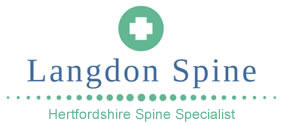Neck Pain
Cervical spondylosis is the medical term used to refer to general ‘wear and tear’ that occurs between the bones in the neck. The condition is also known as degenerative osteoarthritis. Cervical spondylosis can lead to episodes of stiffness and neck pain. Cervical spondylosis is common. In severe cases of cervical spondylosis the spinal cord or the nerves in the neck can become compressed.
As we get older, we all will develop wear and tear in our spines, and in particular in our necks. It is estimated that by the age of 70, nearly 100% of all people will have some degree of cervical spondylosis. The majority of people who suffer with cervical spondylosis will experience episodes of neck stiffness and pain. Neck pain arises when these worn joints and discs become inflamed. However, not everyone with cervical spondylosis develops symptoms.
Many people have neck pain which has got nothing to do with cervical spondylosis. The commonest cause of neck pain is muscle tension in the neck, shoulders, and upper back. This can also extend into the head causing associated headaches. Poor posture and spending too long slumped over computers and hand held devices are big factors in patients developing muscle tension in their necks and shoulders.
There are 2 common patterns of neck pain:
Constant Neck Pain or Ache
This type of pain generally aggravated after exercise, and made worse by any prolonged activity such as reading or driving. This type of pain can be worse first thing in the morning, and in the evening after a long day.
Repetitive Episodes of Acute Neck Pain
This type of pain generally waxes and wanes. A seemingly trivial activity can lead to an acute episode of severe and incapacitating neck pain developing over the course of a few hours. These episodes can last a few days or a few weeks. Over time the pain may fail to fully resolve between episodes leaving the patient with a constant neck pain or ache, that continues to flare up on a regular basis.
With cervical spondylosis it is possible for the nerves or the spinal cord to become compressed. This is called cervical radiculopathy and cervical myelopathy.
Cervical Radiculopathy
If the nerves are being compressed then this can cause arm pain, numbness, pins and needles and weakness.
Cervical Myelopathy
If the spinal cord is being compressed then this can also lead to numbness, pins and needles, and weakness in the hands. It can also result in a loss of fine hand function making you clumsy with a tendency to drop things, a change in the way that you walk, and a loss of bladder and bowel control.
Tips for Managing Neck Pain
Spinal specialists often use the term conservative management to describe any treatment option that does not involve surgery. Treatment for your neck may be as simple as reassuring you that you do not have a serious problem. However, anyone who has had a neck problem should consider some preventive measures to protect their neck from further problems in the future. Most patients will benefit from seeing a physiotherapist, an osteopath, or a chiropractor.
Neck pain is common. However, there are a number of simple things that you can do to optimize the condition of your neck, which when combined can form an effective strategy that allows you to become more comfortable and active.
Stretching: The aim of stretching is to maintain the range of movement of your neck. You should stretch the rest of your body as well as your neck. A physiotherapist, osteopath or chiropractor will help you to develop a program of stretches that you can then perform two or three times a day on your own. The aim is to allow your neck to have freer movement so that you do not injure your neck when engaging in trivial activities.
Regular exercise: With the help of your physical therapist you should develop an exercise regimen to strengthen the muscles associated with the neck, shoulder girdle and chest. These exercises need to be done regularly enough to strengthen your muscles. Swimming backstroke can be helpful as part of your regimen. The difficulty comes in maintaining your exercise regimen long term. As you start to get more comfortable you can begin to slowly return to more enjoyable forms of exercise.
Much of the strength and stability of the spine comes from the muscles of the stomach, back and upper thigh. These muscle groups form your own ‘internal muscular corset’ or ‘core’ that serves to support and protect your spine. Many people think that looking after you core is only important for lower back, but having a good core is equally as important for patients with neck problems, as having a strong core will help with your general spine control and posture. Your physical therapist will be able to teach you specific core strengthening exercises. As you become more comfortable with these exercises then you may benefit from joining a Pilates class.
It is also important that you do some general fitness exercise. High impact sports such as squash, long distance jogging, and rowing should be avoided if possible. Breaststroke swimming can also often aggravate neck problems. To begin with you will often feel sore the day following exercise. If you have a longstanding history of neck pain then it is important that you increase your activity level gradually so that you hopefully avoid getting into a cycle of activity followed by pain and inactivity.
Anti-inflammatory medication: Inflammation of structures in the neck is a big factor in neck pain. Anti-inflammatory medication can be very effective in helping to reduce this inflammation and improve your symptoms.
Many people do not want or feel the need to take regular medication, but prefer to use it only when their symptoms are bad. Even if not taking anything on a regular basis, it can often be helpful to take something half an hour before exercise (or other activity that you feel is likely to aggravate your neck) so as to keep to a minimum any discomfort that you may feel afterwards. If you suffer with your neck first thing in the morning it can be beneficial to take something before you go to bed at night.
What Patients Say
Contact Us
Spire Harpenden Hospital
Amrose Lane
Harpenden
AL5 4BP
(01582) 714 304

